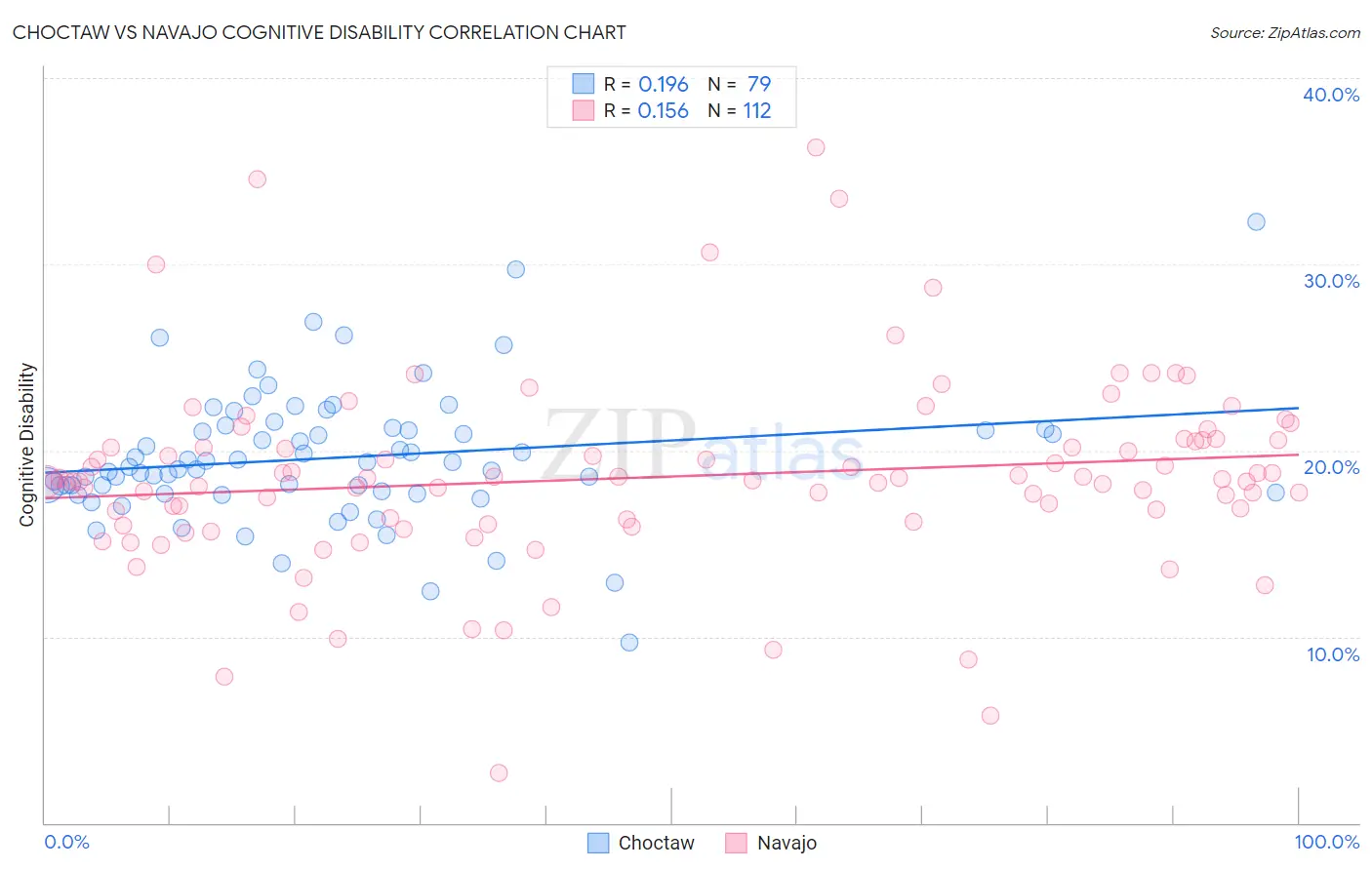Choctaw vs Navajo Cognitive Disability
COMPARE
Choctaw
Navajo
Cognitive Disability
Cognitive Disability Comparison
Choctaw
Navajo
18.4%
COGNITIVE DISABILITY
0.0/ 100
METRIC RATING
310th/ 347
METRIC RANK
18.8%
COGNITIVE DISABILITY
0.0/ 100
METRIC RATING
329th/ 347
METRIC RANK
Choctaw vs Navajo Cognitive Disability Correlation Chart
The statistical analysis conducted on geographies consisting of 269,665,834 people shows a poor positive correlation between the proportion of Choctaw and percentage of population with cognitive disability in the United States with a correlation coefficient (R) of 0.196 and weighted average of 18.4%. Similarly, the statistical analysis conducted on geographies consisting of 224,779,988 people shows a poor positive correlation between the proportion of Navajo and percentage of population with cognitive disability in the United States with a correlation coefficient (R) of 0.156 and weighted average of 18.8%, a difference of 1.8%.

Cognitive Disability Correlation Summary
| Measurement | Choctaw | Navajo |
| Minimum | 9.7% | 2.7% |
| Maximum | 32.3% | 36.3% |
| Range | 22.6% | 33.6% |
| Mean | 19.6% | 18.6% |
| Median | 19.1% | 18.4% |
| Interquartile 25% (IQ1) | 17.8% | 16.2% |
| Interquartile 75% (IQ3) | 21.1% | 20.5% |
| Interquartile Range (IQR) | 3.4% | 4.3% |
| Standard Deviation (Sample) | 3.6% | 5.1% |
| Standard Deviation (Population) | 3.5% | 5.1% |
Demographics Similar to Choctaw and Navajo by Cognitive Disability
In terms of cognitive disability, the demographic groups most similar to Choctaw are Hmong (18.4%, a difference of 0.030%), Chickasaw (18.5%, a difference of 0.31%), Immigrants from Eastern Africa (18.4%, a difference of 0.37%), Yaqui (18.5%, a difference of 0.42%), and Subsaharan African (18.5%, a difference of 0.48%). Similarly, the demographic groups most similar to Navajo are Kiowa (18.7%, a difference of 0.22%), U.S. Virgin Islander (18.7%, a difference of 0.28%), Immigrants from Senegal (18.7%, a difference of 0.33%), Indonesian (18.7%, a difference of 0.34%), and Dominican (18.7%, a difference of 0.42%).
| Demographics | Rating | Rank | Cognitive Disability |
| Immigrants | Eastern Africa | 0.0 /100 | #309 | Tragic 18.4% |
| Choctaw | 0.0 /100 | #310 | Tragic 18.4% |
| Hmong | 0.0 /100 | #311 | Tragic 18.4% |
| Chickasaw | 0.0 /100 | #312 | Tragic 18.5% |
| Yaqui | 0.0 /100 | #313 | Tragic 18.5% |
| Sub-Saharan Africans | 0.0 /100 | #314 | Tragic 18.5% |
| Immigrants | Dominica | 0.0 /100 | #315 | Tragic 18.6% |
| Immigrants | Middle Africa | 0.0 /100 | #316 | Tragic 18.6% |
| Liberians | 0.0 /100 | #317 | Tragic 18.6% |
| Bangladeshis | 0.0 /100 | #318 | Tragic 18.6% |
| Comanche | 0.0 /100 | #319 | Tragic 18.6% |
| Apache | 0.0 /100 | #320 | Tragic 18.6% |
| Africans | 0.0 /100 | #321 | Tragic 18.6% |
| Immigrants | Liberia | 0.0 /100 | #322 | Tragic 18.7% |
| Pueblo | 0.0 /100 | #323 | Tragic 18.7% |
| Dominicans | 0.0 /100 | #324 | Tragic 18.7% |
| Indonesians | 0.0 /100 | #325 | Tragic 18.7% |
| Immigrants | Senegal | 0.0 /100 | #326 | Tragic 18.7% |
| U.S. Virgin Islanders | 0.0 /100 | #327 | Tragic 18.7% |
| Kiowa | 0.0 /100 | #328 | Tragic 18.7% |
| Navajo | 0.0 /100 | #329 | Tragic 18.8% |